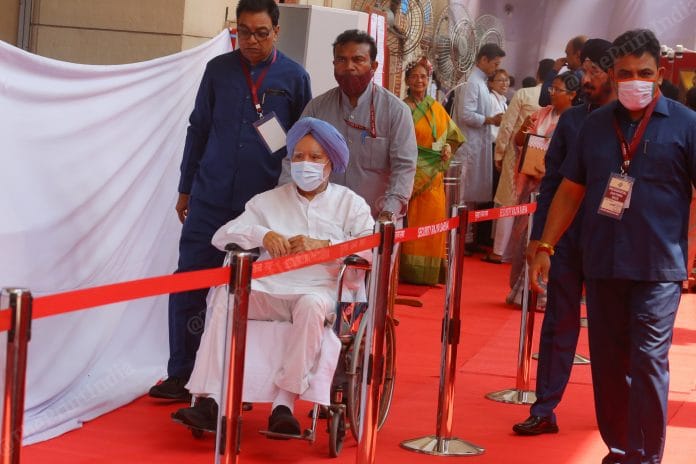New Delhi: On the eve of the G20 Leaders Summit this weekend, former Prime Minister Manmohan Singh has said that India was correct to prioritise its own interests rather than take sides in the Russia-Ukraine conflict.
In an interview to The Indian Express, Singh said India did the right thing in choosing to put its sovereign and economic interests first, while also appealing for peace.
He added that “it is in India’s economic interests to not get trapped in conflicts and maintain an equilibrium of trading relationships across nations and regions”, amid rapidly shifting global trade politics.
India’s stand on Russia’s invasion of Ukraine has been clear and consistent with Prime Minister Narendra Modi having urged both sides to resolve issues through dialogue and diplomacy since “it is not an era of war”.
At the same time, India has declined to participate in any UN resolution against Russia, maintaining its trade ties with the country.
The Russia-Ukraine conflict has emerged as the sole sticking point in a declaration from the Leaders’ Summit this weekend with the West insisting on a strong condemnation as a prerequisite.
Russia’s foreign minister Sergey Lavrov, who is standing in for Vladimir Putin has said on the other hand that Moscow would block the declaration if it did not reflect its stand on the conflict.
Meanwhile, Manmohan Singh expressed his hopes about India’s future in the interview, and spoke about the changing global order, the shift in trade and economies and the challenges that lie ahead.
Voicing his concerns and optimism, Singh added that while he was “more optimistic than worried about India’s future”, his hope depended on India preserving its harmony and diversity.
“I am more optimistic about India’s future than worried. However, my optimism is contingent on India being a harmonious society, which is the bedrock for all progress and development. India’s innate instinct is to welcome and celebrate diversity which must be preserved,” he said.
On navigating domestic and foreign politics
Speaking on the evolving role of foreign policy in domestic politics, the former PM expressed his happiness at India playing host to the world leaders as the G20 president this year. He added that foreign policy played an important element in India’s governance, and had more relevance in domestic politics than ever before. However, he cautioned against using diplomacy as a tool for “party or personal politics”.
Singh said as a growing economy, India commanded global respect and has a “pivotal role to play in steering the new world order” post the Russia-Ukraine conflict and the geopolitical rift between China and the West.
Highlighting the role of the G20 during the 2008 financial crisis, Singh said it was not meant to be a forum for settling security-related conflicts but to “focus on policy coordination to tackle the challenges of climate, inequality and confidence in global trade”.
India-China: ‘Diffuse bilateral tensions’
While he refrained from offering any advice to the incumbent government on the India-China relationship, he hoped that Prime Minister Narendra Modi would take necessary action to “protect India’s territorial and sovereign integrity and diffuse bilateral tensions”. He also said that Chinese President Xi Jinping’s absence at the summit was “unfortunate”.
Singh believes India is on its way to becoming an “economic powerhouse” and should focus and capitalise on manufacturing and production along with services putting to use both human and natural resources – while transitioning to more eco-friendly and clean technologies.
On Chandrayaan’s success
Congratulating the Indian Space Research Organisation on its feat, Singh said Chandrayaan’s success has proved that India’s scientific establishment is among the best in the world, adding that, it was also a result of “efforts over the last seven decades in promoting scientific temper in society and creating institutions”.
Also read:






